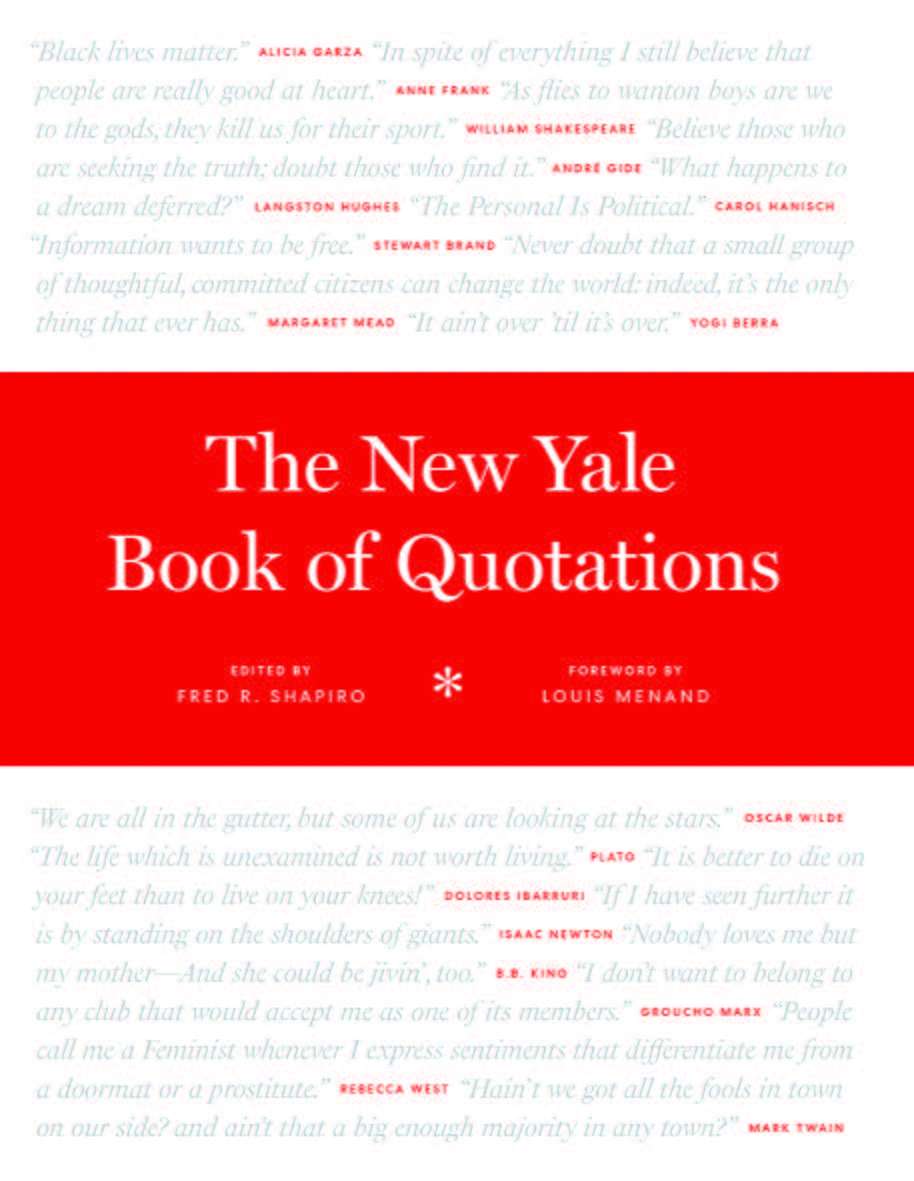The Volokh Conspiracy
Mostly law professors | Sometimes contrarian | Often libertarian | Always independent
The New Yale Book of Quotations Is Published (Post 1 of 3)
The first truly accurate and thorough quotation dictionary just got even more accurate and thorough.

The New Yale Book of Quotations has just been published by Yale University Press. This volume is a greatly enhanced edition of the 2006 book that was named by the Wall Street Journal as the second most essential of all reference works. State-of-the-art research has been employed to reach far beyond the information in other collections in tracing the true origins of famous quotes. The highlights and lowlights of recent culture are also encompassed. There is a special emphasis on legal and political quotations.
Below is the first part of the book's introduction. The "art of the quotation dictionary" is explained. We all quote, and quotations are a communal bond uniting us with past culture and with other lovers of words and ideas. The New Yale Book of Quotations is geared to the needs of contemporary readers, presenting ample coverage of modern and American materials in all fields but also the classic words of older and non-American sources. The quotation compiler needs to "know a great quotation when he or she sees it," to paraphrase Potter Stewart on obscenity. The ideal quotation should sparkle.
The Yale Book of Quotations was published in 2006, with two principal ambitions: to capture the most famous quotations more comprehensively than other compilations, and to use pioneering research methods to trace quotations to their true origins. The response by reviewers and readers was overwhelmingly positive -- for example, an article in the Wall Street Journal named the YBQ as the second most essential of all reference books. Yet in hindsight the first edition may be seen as a pathbreaking starting point. Subsequently, with much help from many talented researchers from around the world who were inspired by that edition, the editor has been able to fully revolutionize our knowledge of the history of famous quotes. In addition, his investigations have revealed the striking fact that many familiar sayings were authored by women whose role has been forgotten, and who have often had their verbal inventions credited to prominent men.
The extensive quotation discoveries and improvements that have been made since 2006 are now unveiled in The New Yale Book of Quotations. At a time when the values of accuracy and truth are increasingly under siege, this volume presents documented true sources for the words of insight, wit, eloquence, and history that are beloved or remembered by so many of us. Also unveiled here are the most notable quotations from the culture and politics of recent years, the products of a frenetic and turbulent era.
The Art and Science of the Quotation Dictionary
Quotations are a fundamental mechanism for the transmission of art and thought. Ralph Waldo Emerson wrote, "By necessity, by proclivity, and by delight, we all quote." The delight is our natural response to the monuments of creativity and wisdom kept alive by quotations, a communal bond uniting us with past culture and with other lovers of words and ideas in our own time. A dictionary of quotations supports the communal bond.
The Yale Book of Quotations was the first major quotation book geared to the needs of the contemporary reader. This new edition continues to provide ample coverage of modern and American materials, encompassing such areas as popular culture, children's literature, sports, computers, politics, law, and the social sciences, as well as presenting the best-known quotations from older literary and historical sources and from worldwide cultures. Many hundreds of very famous and popular quotations omitted from other quotation dictionaries will be found in these pages.
The Yale Book was also the first quotation book to be compiled using state-of-the-art research methods to seek out quotations and to trace quotation sources to their authentic origins or earliest discoverable occurrences. Essentially, the approach used was the same as that of historical dictionaries, such as The Oxford English Dictionary, that try to trace words back to their oldest findable uses. The New Yale Book of Quotations, like its predecessor, may be viewed as a historical dictionary of quotations.
Both art and science come into play in compiling a quotation dictionary. The art requires the dictionary compiler to be sufficiently attuned to the intensity and impact of words so that he (or she) "knows" a great quotation "when he sees it," to paraphrase Supreme Court Justice Potter Stewart on pornography. Like Emily Dickinson recognizing poetry, the quotation anthologist responds to the verbal quarry with the sense that "it makes my body so cold no fire can ever warm me…. I feel physically as if the top of my head were taken off."
The ideal quotation for inclusion should sparkle, like Anatole France's comment on the "majestic equality of the law, which forbids the rich as well as the poor to sleep under bridges, to be in the streets, and to steal bread." In that respect it might resemble the people who, according to Jack Kerouac, "never yawn or say a commonplace thing, but burn, burn, burn like fabulous yellow roman candles exploding like spiders across the stars." Or it should be famous enough that it is part of the conversation of arts and ideas in a culture, like Lord Acton's observation: "Power tends to corrupt and absolute power corrupts absolutely."


Show Comments (9)